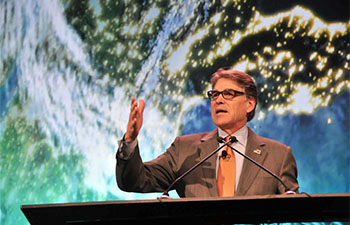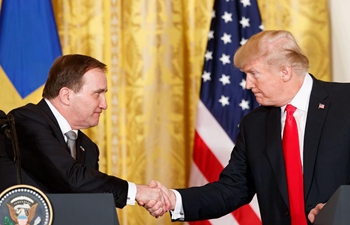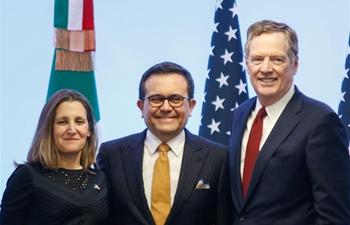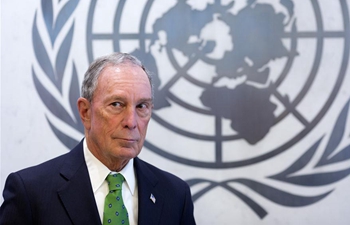BEIJING, March 9 (Xinhua) -- U.S. President Donald Trump on Thursday formally signed proclamations to impose steep tariffs on imported steel and aluminum amid mounting dissent from business groups and trading partners around the world.
The United States will impose a 25-percent tariff on imported steel and 10 percent on aluminum, Trump said at an event at the White House, adding that a strong steel and aluminum industry was "vital to our national security."
The tariffs will take effect in 15 days with initial exemptions for Canada and Mexico pending the renegotiation of the North American Free Trade Agreement (NAFTA).
"We're going to hold off the tariff on those two countries, to see whether or not we're able to make the deal on NAFTA," Trump said.
Trump signaled that all other countries also have opportunities to be exempt from the tariffs by negotiations with the United States.
"If the same goals can be accomplished by other means, America will remain open to modifying or removing the tariffs for individual nations, as long as we can agree on a way to ensure that their products no longer threaten our security," he said.
While Trump said that new tariffs would boost American steel and aluminum production, economists and business groups warned that they could backfire and ultimately hurt the overall U.S. economy.
China on Friday expressed "firm opposition" to the move, with a Ministry of Commerce (MOC) official saying the decision would "have a huge impact on normal international trade order."
"The steel and aluminum products imported by the United States are middle- and low-end products for civil use, which by no means hurt U.S. national security," Wang Hejun, head of the MOC trade remedy and investigation bureau, said in a statement.
"If the final measures of the United States hurt Chinese interests, China will work with other affected countries in taking measures to safeguard its own rights and interests," Wang added.
In Germany, the economic engine of the European Union -- the United States' biggest trade partner by volume -- the German Steel Federation warned of "drastic consequences" to the German and European steel industry.
Hans Juergen Kerkhoff, president of the federation, was quoted by German news agency DPA as saying that Trump's decision threatens to divert a large amount of steel and cause a spiral of protectionism. He urged quick decisions to cope with the situation.
Brazil, the largest economy in Latin America, reacted to the U.S. decision "with great concern" on Thursday, warning the measures will severely damage Brazilian exports and hurt business flows with the United States.
"These measures will cause severe damage to Brazilian exports and will have a significantly negative impact on bilateral flows, which have been broadly favorable to the United States for the last 10 years," said a joint statement from the Foreign Ministry and the Ministry of Industry, Foreign Trade and Services.
Brazil would take "all necessary actions, in the bilateral and multilateral spheres, to preserve its rights and interests," the statement said. It added that these tariffs were incompatible with U.S. obligations as a member of the World Trade Organization (WTO).
Brazil's National Confederation of Industry estimates these tariffs will cause the Brazilian industry an annual loss of 3.15 billion U.S. dollars.
Trump imposed the tariffs by invoking the little-known Section 232 of the Trade Expansion Act from 1962, saying steel imports are hurting U.S. national security. Critics, however, questioned the threat and said the measures contradict WTO rules.
Elaborating on a new trade approach, the White House suggested in a document sent to the U.S. Congress on Feb. 28 that it could ignore certain rulings by the WTO and unilaterally impose tariffs on countries it sees as conducting unfair trade practices.
In February when Trump made his intentions public, Matt Gold, an international trade law expert at Fordham University in New York City, told CNN that "such a flagrant violation of the (WTO) rules" will not only "open the door for tit-for-tat responses from other countries" but also "shake the foundation of the whole global trading system."
A recent study by Trade Partnership, a Washington, D.C.-based consulting firm, also estimated that Trump's new tariffs on steel and aluminum would result in a net loss of 146,000 U.S. jobs after accounting for positive impacts on U.S. steel and aluminum producers.
"I disagree with this action and fear its unintended consequences," House Speaker Paul Ryan said shortly after Trump's announcement of the tariffs.
Senate Finance Committee Chairman Orrin Hatch expressed similar concerns about the proposed tariffs, saying, "This is a tax hike on American manufacturers, workers and consumers."
"Slapping aluminum and steel imports with tariffs of this magnitude is misguided. It undermines the benefits that the new tax law provides and runs counter to our goal of advancing pro-growth trade policies that will keep America competitive in the 21st century global economy," Hatch said in a statement.













